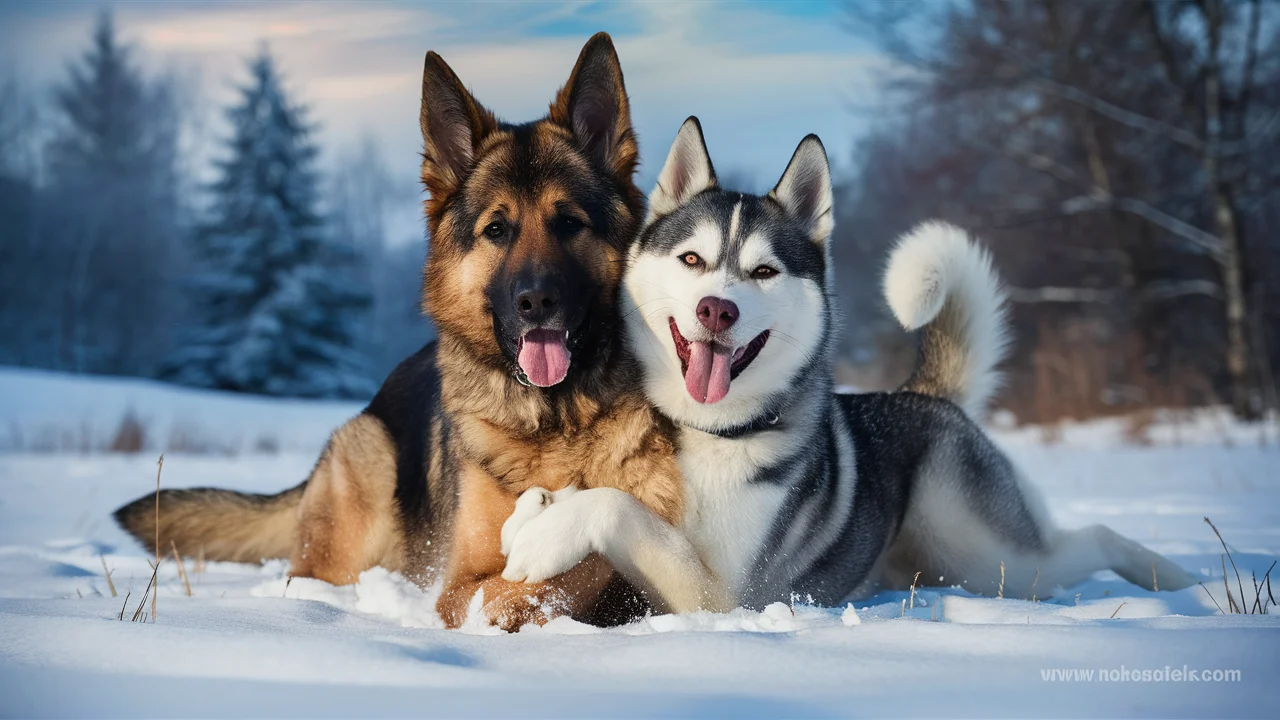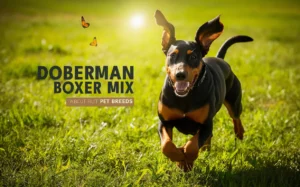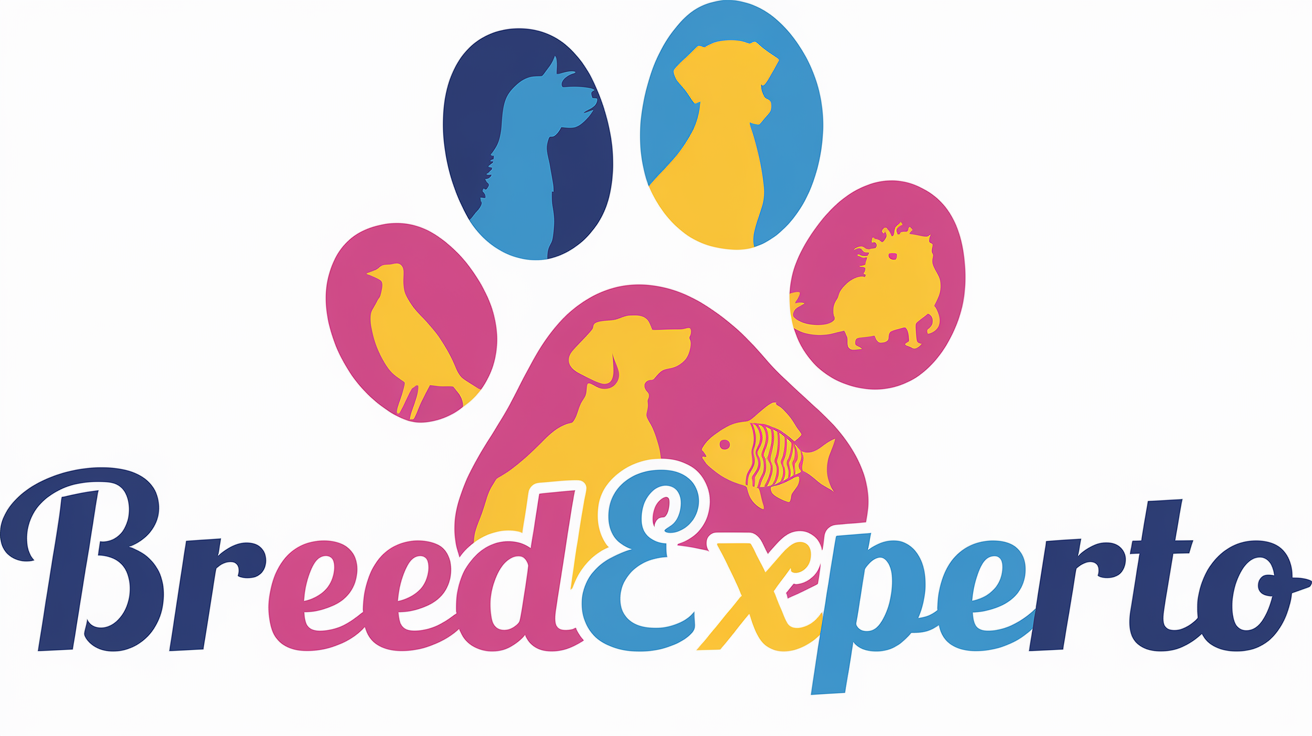The German Shepherd Husky mix is a captivating blend of two incredibly popular breeds. Known for their intelligence, strength, and striking looks, these hybrids have gained a dedicated following among dog lovers.
In this blog post, we’ll explore the various aspects of this mix, from its history and appearance to its temperament, training needs, and health considerations.
Overview of the German Shepherd Husky Mix
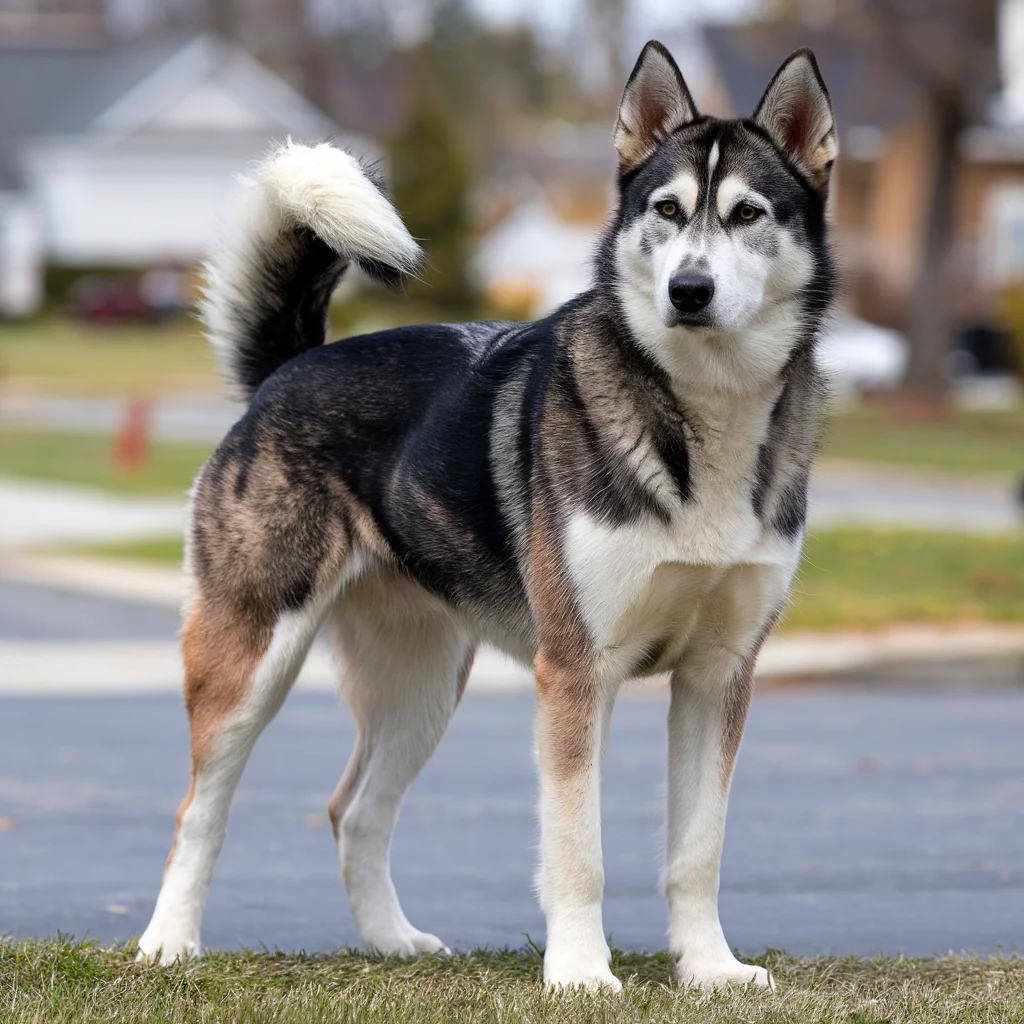
The German Shepherd Husky mix, often referred to as the Gerberian Shepsky, is a designer dog that combines the best traits of its parent breeds. This hybrid typically inherits the intelligence and loyalty of the German Shepherd, along with the playful spirit and striking appearance of the Siberian Husky.
Why Choose a German Shepherd Husky Mix?
Choosing a German Shepherd Husky mix can be appealing for several reasons:
- Intelligence: Both parent breeds are highly intelligent, making them easy to train.
- Physical Attractiveness: Their unique looks often capture attention with their stunning coats and expressive eyes.
- Versatile Companions: They adapt well to various lifestyles, making them suitable for active families and individuals.
History of the German Shepherd Husky Mix
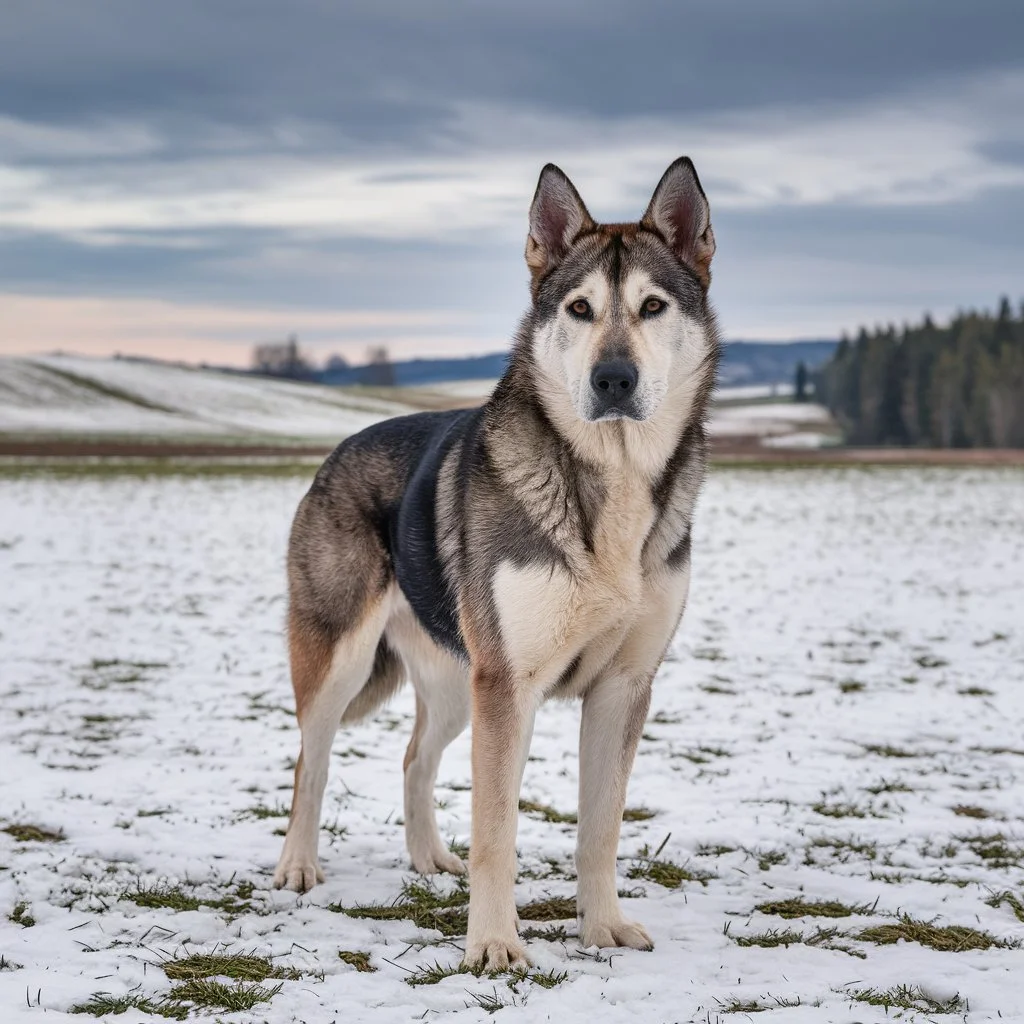
To fully understand the Gerberian Shepsky, it’s essential to delve into the histories of its parent breeds.
German Shepherd
- Origin: The German Shepherd was developed in Germany in the late 19th century.
- Purpose: Initially bred for herding and protecting sheep, their intelligence and versatility led them to serve in various roles, including police and military work.
- Characteristics: Known for their loyalty, courage, and intelligence, German Shepherds are often seen as ideal working dogs.
Siberian Husky
- Origin: The Siberian Husky hails from Siberia, where they were bred by the Chukchi people for sled pulling and companionship.
- Purpose: They are known for their endurance and ability to thrive in cold climates, making them exceptional working dogs in harsh conditions.
- Characteristics: Huskies are friendly, energetic, and known for their striking blue or multi-colored eyes.
Emergence of the Mix
The German Shepherd Husky mix emerged as breeders sought to create a dog that embodies the best traits of both parent breeds. This hybrid combines the intelligence, loyalty, and trainability of the German Shepherd with the energy, friendliness, and striking appearance of the Siberian Husky.
Distinctive Appearance
One of the most striking features of the German Shepherd Husky mix is its unique appearance. These dogs often inherit physical traits from both parent breeds, resulting in a captivating blend.
Size and Build
- Height: Typically ranges from 20 to 25 inches at the shoulder.
- Weight: Can weigh between 40 to 80 pounds, depending on the dominance of either parent breed.
Coat and Color
The coat of a German Shepherd Husky mix is often thick and double-layered, providing insulation and protection.
| Coat Type | Description |
| Length | Medium to long |
| Texture | Dense and fluffy |
| Colors | Black, gray, brown, red, and combinations, including the distinctive markings of both breeds |
Eye Color
One of the standout features of the mix is its eye color, which can vary greatly. Some common eye colors include:
- Blue
- Brown
- Amber
- Heterochromia (one eye of each color)
Temperament and Behavior
Understanding the temperament and behavior of the German Shepherd Husky mix is essential for potential owners.
Personality Traits
This hybrid tends to inherit a mix of personality traits from both parent breeds, resulting in a well-rounded, yet complex, temperament. Key traits include:
- Intelligence: Both breeds are known for their intelligence, making the mix highly trainable but also requiring mental stimulation.
- Loyalty: They are fiercely loyal and protective of their families, often forming strong bonds with their owners.
- Energetic: This mix is highly energetic and requires regular exercise to maintain their health and happiness.
- Playful Nature: Their playful demeanor often makes them great companions for families with children.
Social Behavior
The German Shepherd Husky mix generally gets along well with children and other pets, especially if socialized from a young age. However, early socialization is crucial to prevent any aggressive tendencies, especially inherited from the German Shepherd side.
Common Behavioral Challenges
While they are generally good-natured, some common behavioral issues may arise, such as:
- Separation Anxiety: This mix can suffer from separation anxiety if left alone for long periods.
- Stubbornness: They may exhibit stubborn behavior, particularly during training sessions.
Grooming Your German Shepherd Husky Mix
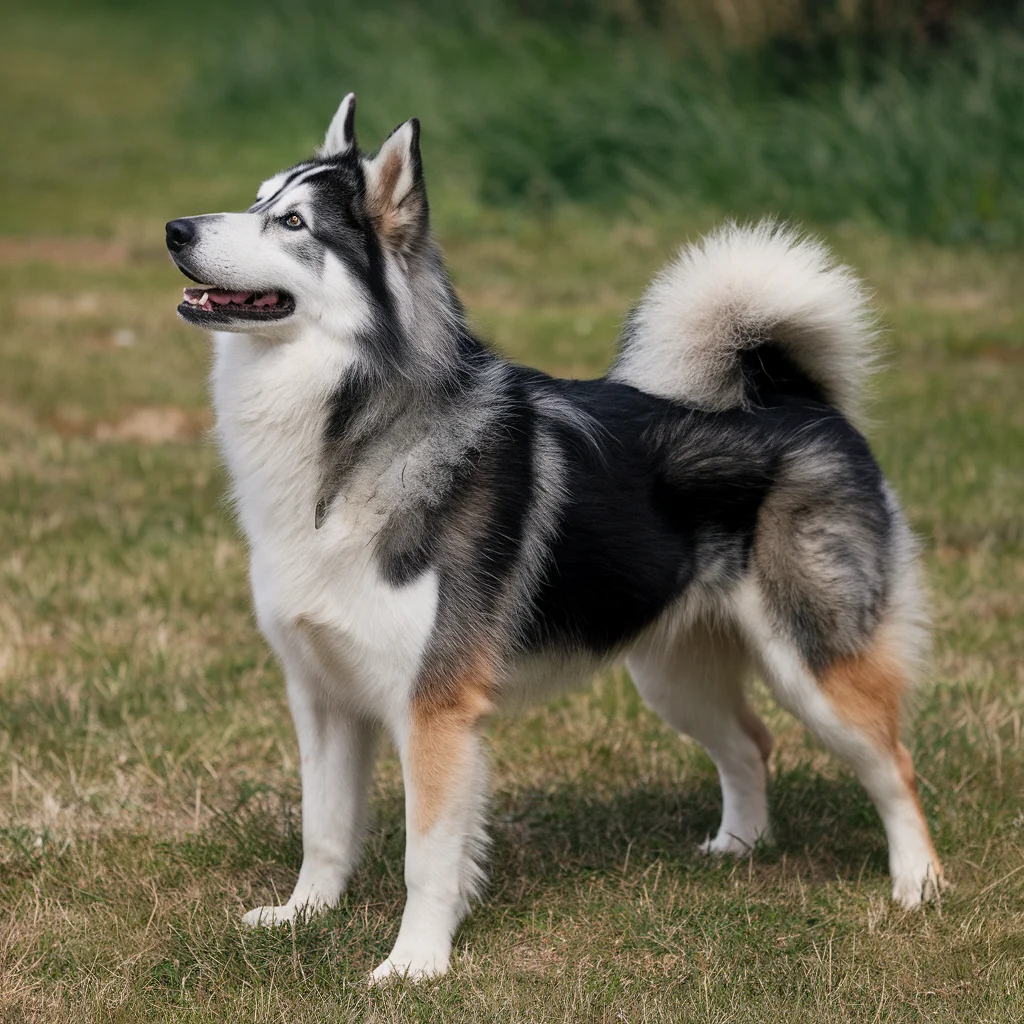
Grooming is an essential aspect of caring for a German Shepherd Husky mix. Their thick double coat requires regular maintenance to keep it healthy and free of mats.
Coat Care
- Brushing: Aim to brush your dog at least once a week. During shedding season (spring and fall), you may need to brush them daily to manage the loose hair.
- Bathing: Bathe them every few months or when they become dirty. Use a dog-specific shampoo to avoid skin irritation.
- Professional Grooming: Consider scheduling professional grooming sessions if you feel overwhelmed by coat maintenance.
Nail Trimming and Ear Cleaning
- Nail Trimming: Keep nails trimmed to prevent discomfort or injury. Depending on their activity level, trimming every 4-6 weeks is advisable.
- Ear Cleaning: Regularly check and clean your dog’s ears to prevent infections, especially if they have floppy ears.
Training and Socialization Essentials
Training and socialization are crucial for the German Shepherd Husky mix, given their intelligence and energy levels.
Importance of Early Socialization
Socializing your dog from a young age helps them become well-adjusted adults. Expose them to various environments, people, and other animals to help reduce anxiety and aggressive behavior.
Recommended Training Methods
- Positive Reinforcement: Use treats, praise, and toys to reward good behavior. This method encourages your dog to repeat desired actions.
- Consistency: Maintain consistency in commands and training sessions to help your dog understand expectations.
- Basic Commands: Start with basic commands like sit, stay, and come. Gradually progress to more complex commands as your dog learns.
Common Behavioral Issues and Solutions
If your German Shepherd Husky mix exhibits behavioral problems, consider the following solutions:
| Behavioral Issue | Solution |
| Separation Anxiety | Gradually increase alone time and provide toys to keep them occupied. |
| Excessive Barking | Identify triggers and provide training to reduce unnecessary barking. |
| Stubbornness | Be patient and consistent; consider professional training if needed. |
Health Considerations and Longevity
While the German Shepherd Husky mix is generally healthy, it’s essential to be aware of potential health issues.
Common Health Issues
This hybrid may inherit health problems from both parent breeds, including:
- Hip Dysplasia: A common condition in both breeds, characterized by an improper formation of the hip joint.
- Eye Conditions: Such as cataracts or progressive retinal atrophy.
- Allergies: Skin allergies may occur, necessitating special diets or medications.
Recommended Health Screenings
Regular veterinary check-ups are vital to maintain your dog’s health. Suggested screenings include:
- Hip evaluations
- Eye examinations
- Allergy testing
Average Lifespan
The average lifespan of a German Shepherd Husky mix is approximately 10 to 15 years, depending on genetics, health, and lifestyle.
Exercise and Nutritional Needs
Meeting the exercise and nutritional needs of a German Shepherd Husky mix is crucial for their overall well-being.
Daily Exercise Requirements
This mix is highly energetic and requires plenty of exercise to stay healthy. Aim for:
- At least 1 to 2 hours of exercise each day. Activities can include:
- Long walks or jogs
- Playing fetch
- Hiking
- Agility training
Ideal Diet
Providing a well-balanced diet is essential for your dog’s health. Look for high-quality dog food that lists meat as the primary ingredient. Consider the following guidelines:
| Nutritional Needs | Details |
| Protein | 20-30% of daily intake |
| Fats | 8-15% of daily intake |
| Carbohydrates | Limited; focus on whole grains and veggies |
Feeding Schedule
- Puppies: Feed 3-4 small meals a day until they are about 6 months old.
- Adults: Transition to 2 meals a day, adjusting portions based on activity level and weight.
Is the German Shepherd Husky Mix Right for You?
Before adopting a German Shepherd Husky mix, it’s crucial to consider if this breed fits your lifestyle.
Lifestyle Compatibility
- Active Families: Ideal for active families who can dedicate time to exercise and training.
- Experience Level: Recommended for owners with previous dog experience due to their strong-willed nature.
- Time Commitment: Owners must commit to regular grooming, training, and socialization.
Pros and Cons
| Pros | Cons |
| Intelligent and trainable | Requires significant exercise |
| Loyal and protective | Can be stubborn |
| Striking appearance | Potential for separation anxiety |
Conclusion
The German Shepherd Husky mix is a unique and rewarding breed that can bring joy and companionship to your life. With proper care, training, and socialization, these dogs can thrive in various environments, becoming loving members of the family.
If you’re ready for an active, intelligent, and loyal companion, the Gerberian Shepsky might just be the perfect match for you.
Additional Resources
To learn more about the German Shepherd Husky mix, consider exploring the following resources:
- Reputable Breeders: Seek breeders who prioritize health testing and ethical breeding practices.
- Shelters and Rescues: Many mixes end up in shelters; consider adopting.
- Community Forums: Join online communities to connect with other German Shepherd Husky mix owners for support and advice.
By thoroughly understanding the traits and needs of the German Shepherd Husky mix, you can ensure a fulfilling relationship with your future furry friend.
